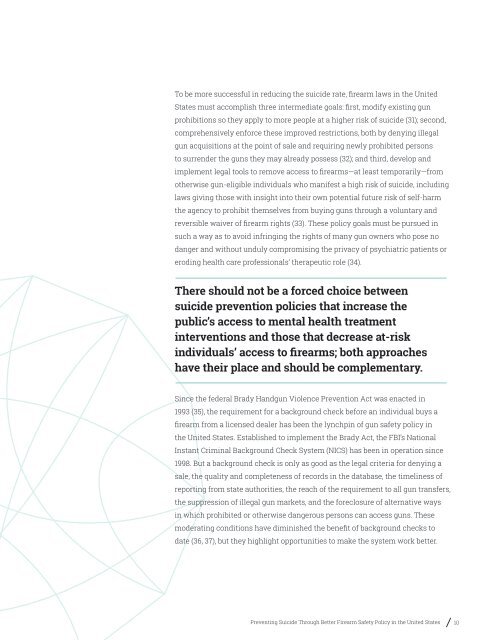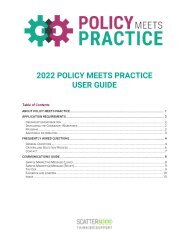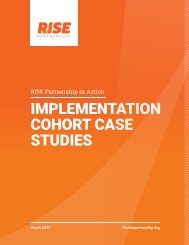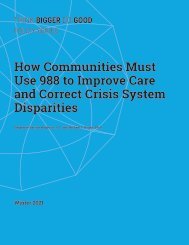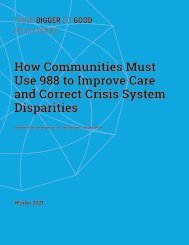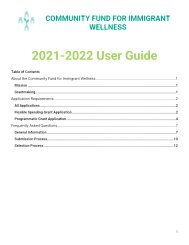PreventingSuicide_FireArmSafety_9_18_2020
You also want an ePaper? Increase the reach of your titles
YUMPU automatically turns print PDFs into web optimized ePapers that Google loves.
To be more successful in reducing the suicide rate, firearm laws in the United<br />
States must accomplish three intermediate goals: first, modify existing gun<br />
prohibitions so they apply to more people at a higher risk of suicide (31); second,<br />
comprehensively enforce these improved restrictions, both by denying illegal<br />
gun acquisitions at the point of sale and requiring newly prohibited persons<br />
to surrender the guns they may already possess (32); and third, develop and<br />
implement legal tools to remove access to firearms—at least temporarily—from<br />
otherwise gun-eligible individuals who manifest a high risk of suicide, including<br />
laws giving those with insight into their own potential future risk of self-harm<br />
the agency to prohibit themselves from buying guns through a voluntary and<br />
reversible waiver of firearm rights (33). These policy goals must be pursued in<br />
such a way as to avoid infringing the rights of many gun owners who pose no<br />
danger and without unduly compromising the privacy of psychiatric patients or<br />
eroding health care professionals’ therapeutic role (34).<br />
There should not be a forced choice between<br />
suicide prevention policies that increase the<br />
public’s access to mental health treatment<br />
interventions and those that decrease at-risk<br />
individuals’ access to firearms; both approaches<br />
have their place and should be complementary.<br />
Since the federal Brady Handgun Violence Prevention Act was enacted in<br />
1993 (35), the requirement for a background check before an individual buys a<br />
firearm from a licensed dealer has been the lynchpin of gun safety policy in<br />
the United States. Established to implement the Brady Act, the FBI’s National<br />
Instant Criminal Background Check System (NICS) has been in operation since<br />
1998. But a background check is only as good as the legal criteria for denying a<br />
sale, the quality and completeness of records in the database, the timeliness of<br />
reporting from state authorities, the reach of the requirement to all gun transfers,<br />
the suppression of illegal gun markets, and the foreclosure of alternative ways<br />
in which prohibited or otherwise dangerous persons can access guns. These<br />
moderating conditions have diminished the benefit of background checks to<br />
date (36, 37), but they highlight opportunities to make the system work better.<br />
Preventing Suicide Through Better Firearm Safety Policy in the United States 10


